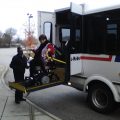
This post was written by Aubrey Hill, a former member of our team.
Growing up in a densely populated suburban area, I realize that I took for granted my proximity to needed health services. Ten miles was the furthest we’d ever traveled to reach my pediatrician’s office or my dentist’s office, and the closest emergency room was only two miles away from my childhood home. The health needs of most rural Coloradans aren’t all that different from my own, but the distance they have to travel is often much more than ten miles. And if they reside in one of the eighteen Colorado counties that lacks a hospital, travel time for some residents could be considerably longer. To further complicate this problem, there are many who reside in rural communities who lack stable transportation.
A lack of transportation is a barrier to good health, and a particularly powerful one in more remote areas of the state. There are obvious transportation advantages to living in a metropolitan area with a network of buses, light rail lines, and easy biking or walking opportunities, though we know that even in our urban areas, there are still plenty of Coloradans who cannot reach their health care provider easily. In rural areas, most of which have little or no public transportation infrastructure, the situation can be even more difficult. In her health story, Terry, a Rocky Ford resident, talks about the challenges her husband’s patients face in getting to their clinic. She explains that patients will suddenly cancel their appointments when a family member unexpectedly needs their one family car for a job obligation. She says, “That was a surprise to me—that even as small as our town is, there is a real limited mobility among people.”
A report from The Colorado Trust found that throughout the state’s rural areas, transportation is perceived to be a major community issue. Twenty-nine communities were surveyed, and 86% of the rural communities indicated transportation as a major community issue versus 50% of the urban areas. Within each rural community, however, you can find great variances in the need and the resources available. Some communities can build off existing infrastructure, like Summit County’s ski shuttles, while others may be starting from nothing. Other counties cobble together solutions between available bus routes, volunteers giving rides, the non-emergency transportation benefit for Medicaid patients, and the use of cab vouchers.
Other innovative transportation solutions under development around the state involve bringing health care to the patient. Eagle County is one such example, where paramedics within the local EMT or fire service act as follow-up for basic care needs as patients are discharged from the hospital. Trained EMS visit the patient at home to ensure that they understand their discharge instructions, follow medication procedures, and get their vitals, such as their blood pressure, checked regularly. This reduces or eliminates one barrier to care patients might be facing and also helps avoid costly readmissions.
The advantage of a smaller populace in a rural community means there is a greater intimacy with the issues at hand as well as the availability of resources. It is clear that many communities across the state understand transportation as a barrier to good health and access to care, so we must continue to work intently and creatively to find successful solutions.




